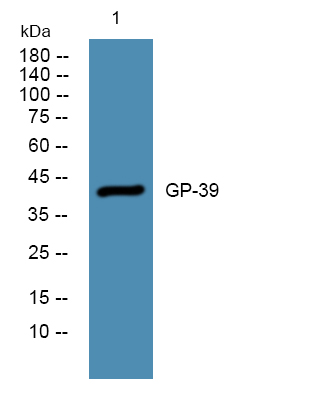GP-39 Polyclonal Antibody
- Catalog No.:YT6211
- Applications:IHC;IF;WB
- Reactivity:Human;Rat;Mouse;
- Target:
- GP-39
- Gene Name:
- CHI3L1
- Protein Name:
- GP-39
- Human Gene Id:
- 1116
- Human Swiss Prot No:
- P36222
- Immunogen:
- Synthesized peptide derived from human GP-39
- Specificity:
- This antibody detects endogenous levels of human GP-39
- Formulation:
- Liquid in PBS containing 50% glycerol, 0.5% BSA and 0.02% sodium azide.
- Source:
- Polyclonal, Rabbit,IgG
- Dilution:
- IHC 1:50-200, WB 1:500-2000. IF 1:50-200
- Purification:
- The antibody was affinity-purified from rabbit antiserum by affinity-chromatography using epitope-specific immunogen.
- Concentration:
- 1 mg/ml
- Storage Stability:
- -15°C to -25°C/1 year(Do not lower than -25°C)
- Other Name:
- Chitinase-3-like protein 1 (39 kDa synovial protein;Cartilage glycoprotein 39;CGP-39;GP-39;hCGP-39;YKL-40)
- Observed Band(KD):
- 42kD
- Background:
- Chitinases catalyze the hydrolysis of chitin, which is an abundant glycopolymer found in insect exoskeletons and fungal cell walls. The glycoside hydrolase 18 family of chitinases includes eight human family members. This gene encodes a glycoprotein member of the glycosyl hydrolase 18 family. The protein lacks chitinase activity and is secreted by activated macrophages, chondrocytes, neutrophils and synovial cells. The protein is thought to play a role in the process of inflammation and tissue remodeling. [provided by RefSeq, Sep 2009],
- Function:
- disease:A genetic variation in CHI3L1 is associated with susceptibility to asthma-related traits type 7 (ASRT7) [MIM:611960]. Asthma-related traits include clinical symptoms of asthma, such as coughing, wheezing and dyspnea, bronchial hyperresponsiveness (BHR) as assessed by methacholine challenge test, serum IgE levels, atopy, and atopic dermatitis.,function:Carbohydrate-binding lectin with a preference for chitin. May play a role in defense against pathogens, or in tissue remodeling. May play an important role in the capacity of cells to respond to and cope with changes in their environment.,PTM:Glycosylated.,similarity:Belongs to the glycosyl hydrolase 18 family.,subunit:Monomer.,tissue specificity:Present in activated macrophages, articular chondrocytes, synovial cells as well as in liver. Undetectable in muscle tissues, lung, pancreas, mononuclear cells, or fibroblasts.,
- Subcellular Location:
- Secreted, extracellular space . Cytoplasm . Cytoplasm, perinuclear region . Endoplasmic reticulum .
- Expression:
- Present in activated macrophages, articular chondrocytes, synovial cells as well as in liver. Very low or undetectable expression in non-inflammatory colon. Undetectable in muscle tissues, lung, pancreas, mononuclear cells, or fibroblasts.
- June 19-2018
- WESTERN IMMUNOBLOTTING PROTOCOL
- June 19-2018
- IMMUNOHISTOCHEMISTRY-PARAFFIN PROTOCOL
- June 19-2018
- IMMUNOFLUORESCENCE PROTOCOL
- September 08-2020
- FLOW-CYTOMEYRT-PROTOCOL
- May 20-2022
- Cell-Based ELISA│解您多样本WB检测之困扰
- July 13-2018
- CELL-BASED-ELISA-PROTOCOL-FOR-ACETYL-PROTEIN
- July 13-2018
- CELL-BASED-ELISA-PROTOCOL-FOR-PHOSPHO-PROTEIN
- July 13-2018
- Antibody-FAQs
- Products Images

- Western blot analysis of lysates from Jurkat cells, primary antibody was diluted at 1:1000, 4°over night

- Immunohistochemical analysis of paraffin-embedded human tonsil. 1, Antibody was diluted at 1:200(4° overnight). 2, Tris-EDTA,pH9.0 was used for antigen retrieval. 3,Secondary antibody was diluted at 1:200(room temperature, 30min).



